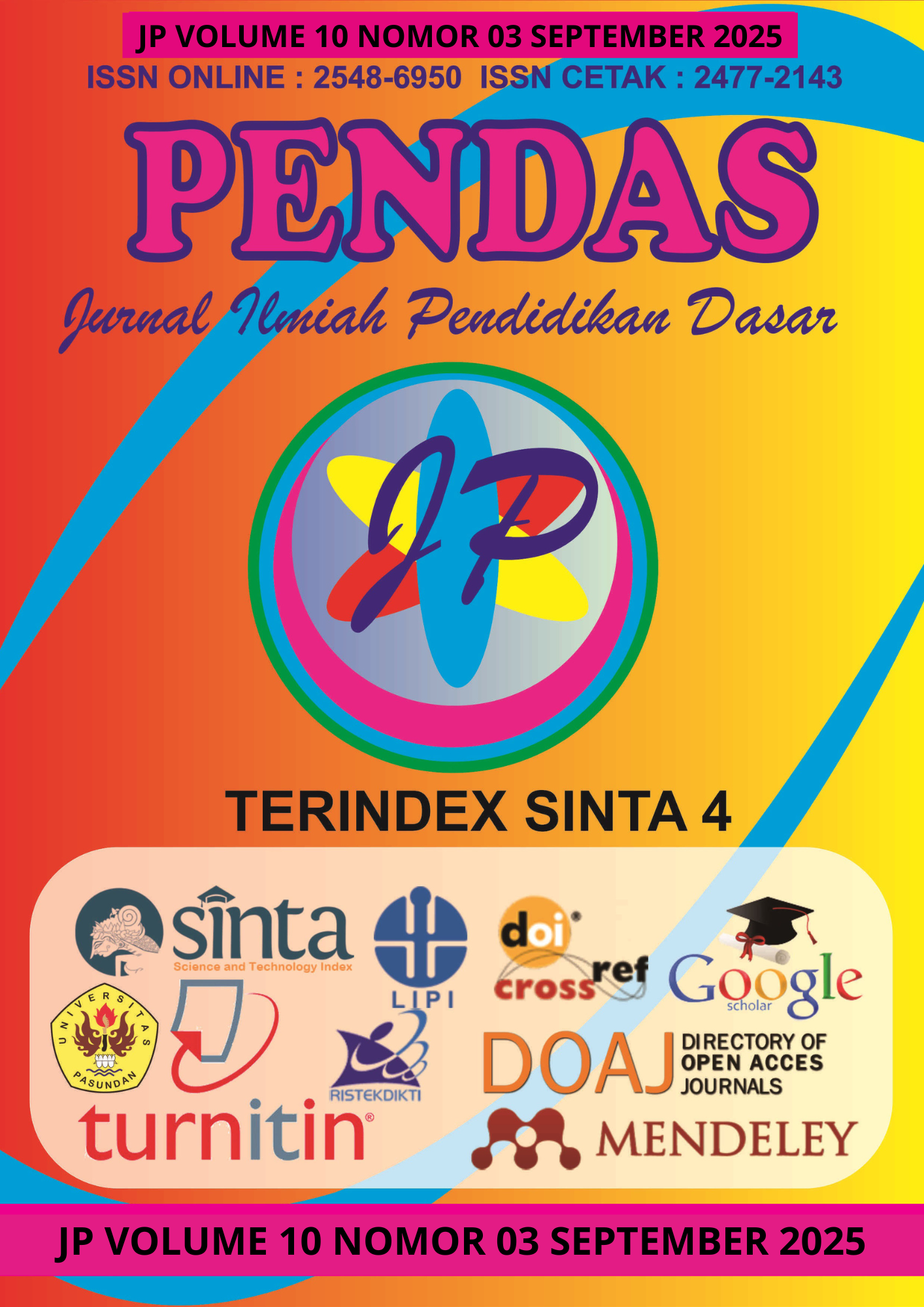PERSEPSI SISWA TENTANG FAKTOR-FAKTOR YANG MEMPENGARUHI HASIL BELAJAR PENDIDIKAN PANCASILA KELAS VII SMP NEGERI 04 PEKANBARU
DOI:
https://doi.org/10.23969/jp.v10i3.28089Keywords:
factors, learning outcomes, persceptionAbstract
This research is based on students' perceptions of the factors that influence the learning outcomes of the Pancasila Education subject at SMP Negeri 04 Pekanbaru. The research problem is: How do students perceive the factors that influence their learning outcomes in the Pancasila Education subject at SMP Negeri 04 Pekanbaru? The research method used is quantitative with a descriptive approach. Based on the results of the study on students' perceptions of the factors influencing learning outcomes in the Pancasila Education subject, it can be concluded from the distribution of the questionnaire that internal factors affecting student learning outcomes consist of physical, psychological, and fatigue factors. The most dominant factor affecting student learning outcomes is the physical factor, with a value of 96.3%. Next is the psychological factor, with a value of 95.5%. The fatigue factor has a percentage value of 94.2%. Furthermore, based on the recapitulation of the questionnaire data analysis, from the students' perspective, internal factors have a significant influence on the learning outcomes of 7th-grade students, with a rate of 95.3%, which is classified as "very high." External factors affecting student learning outcomes consist of the school, family, and the surrounding environment. The environmental factor is the most dominant, with a percentage value of 82.5%. Next, the school factor has a percentage value of 79.7%. The family factor has a value of 53.5%. Based on the recapitulation of the questionnaire data analysis, from the students' perspective, external factors have an influence on the learning outcomes of 7th-grade students, with a value of 80%, which falls into the "high" category. From the explanation above, it can be seen that internal factors have a greater influence on student learning outcomes than external factors.
Downloads
References
Agus Wibowo. 2013. Pendidikan Karakter di Perguruan Tinggi. Yogyakarta: Pustaka Pelajar.
Anas Sudijono. 2011. Pengantar Evaluasi Pendidikan, Jakarta: Raja Grafindo Persada.
Annurrahman. 2012. Belajar dan Pembelajaran, Bandung: Alfabeta.
Baidillah, Aan. 2010. Sikap positif terhadap Pancasila, UUD, NKRI, Bhinneka tunggal ika.Jakarta: PT.Ombak.
Budiyono, Kabul. 2016. Pendidikan Pancasila Untuk Perguruan Tinggi. Bandung: Alfabeta.
Cecep Kustandi. 2013. Media Pembelajaran: Manual dan Digital. Bogor: Ghalia Indonesia.
Djaali, 2011. Psikologi Pendidikan, Jakarta: Bumi Aksara.
Dewi Salma Prawiradilaga. 2009. Prinsip Desain Pembelajaran, Jakarta: Kencana.
Erwan Agus Purwanto. 2017. Metode Penelitian Kuantitatif. Yogyakarta: Gava Media.
Fatih Arifah. 2013. Evaluasi Pembelajaran. Yogyakarta: Mentari Pustaka.
Ghozali, I. 2016. Analisis Multivariate dengan Program SPSS. Badan Penerbit Universitas Diponegoro.
Ghozali, I. 2018. Aplikasi Analisis Multivariate dengan Program IBM SPSS 25 (IX). Badan Penerbit Universitas Diponegoro.
Hikmat. 2012. Manajemen Pendidikan. Bandung: Pustaka Setia.
Kaelan. 2014. Pendidikan Pancasila. Jakarta: Reformasi.
Kunandar. 2015. Penilaian Autentik (Penilaian Hasil Belajar Peserta Didik Berdasarkan Kurikulum 2013). Jakarta: PT. Rajagrafindo.
Margono. 2010. Metodologi Penelitian Pendidikan. Jakarta: Rieneka Putra.
M. Chabib Thoha. 2009. Teknik Pendidikan, Jakarta: Rineka Cipta
Downloads
Published
Issue
Section
License
Copyright (c) 2025 Pendas : Jurnal Ilmiah Pendidikan Dasar

This work is licensed under a Creative Commons Attribution 4.0 International License.



















